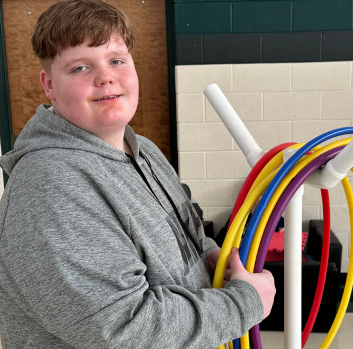By Cindy Adams
Being in a classroom is more than reading, writing and arithmetic. According to Ashley Wittl-Osborne, Director of Education for enCircle’s Minnick Schools, equally important are learning social norms, how to get along with peers, and what it means to be a student. In recent years, however, younger students may not even have set foot in a classroom until they are entering second grade. The grade-level expectations, coupled with no experience in a classroom, equals significant pressure. But that is the reality for students in a post-COVID world.
It should be no surprise that public schools are reporting large increases in behavior issues. Also, CDC data has shown that in 2019-2020, children ages 5-11 had a 24 percent increase in mental health-related emergency room visits and children ages 12-15 had a 31 percent increase.
Aidan is one of these students. He arrived at Minnick after being hospitalized because of aggressive behavior that manifested after the COVID shutdown. While he managed his autism in the public school classroom through eighth grade, the disruption in routine was debilitating for him.
"He was utterly floundering in public school in the aftermath of COVID," explained Bill Sutherland, Wytheville Minnick principal. "No one was sure if Minnick would work, and it was tough going at first. Aidan wanted to either alienate people or only deal with them on his terms."
What helped? Unrelenting patience and care from the Minnick team.
"Over time, he began to understand the nature of our staff and saw that we were going to stick with him, no matter how angry he was," Bill said.
Minnick’s mission to help students who experience challenges in public schools is timely, and enrollment is on the rise, with 23 more students this year compared to last year.
"Schools nationwide are experiencing a crisis that I don’t think we know how to effectively address yet," said Ashley. "We’ve never dealt with a mass shutdown like the one COVID required. We know some of the ways in which students have been negatively impacted, but we’re just seeing the tip of the iceberg."
For students who were already dealing with academic challenges, behavioral challenges, and/or existing trauma, COVID had a double impact.
Aidan’s mom, Beth, was very involved with the public school staff, administration and school board. Given the increased challenges Aidan was facing, they all decided Minnick was his next step. The transition wasn’t easy, but once Aidan was established at Minnick, he slowly began to flourish.
"Minnick has been life-changing for our whole family," Beth said. "He is less impulsive and less destructive. He is soaking up the positive feedback he is getting. I, literally, thank the Lord every day for Minnick."
Aidan still struggles. He still gets angry, and he still works hard to quiet himself, but he has made extraordinary progress. Now, when he gets upset, he will ask to step away for a little bit. He may sit and bang a stick on a tree for 20 minutes, but then he is ready to rejoin the class. Minnick has a structured way to give him that space.
"I am so thankful our public school partners trust Minnick to support some of their students with special needs," said Ashley. "We really can make a positive impact on the students they send to us."
Aidan has made friends at Minnick, and this has greatly contributed to his success. He completes his schoolwork and even gets up in class to answer questions. He has found his place.
"We will do everything possible to help our students, regardless of the issues they are experiencing," said Ashley. "We look at the challenges our public school partners are facing and adapt our services to help them. In the heart of every educator is the desire to make a difference, but no one can do it alone."


